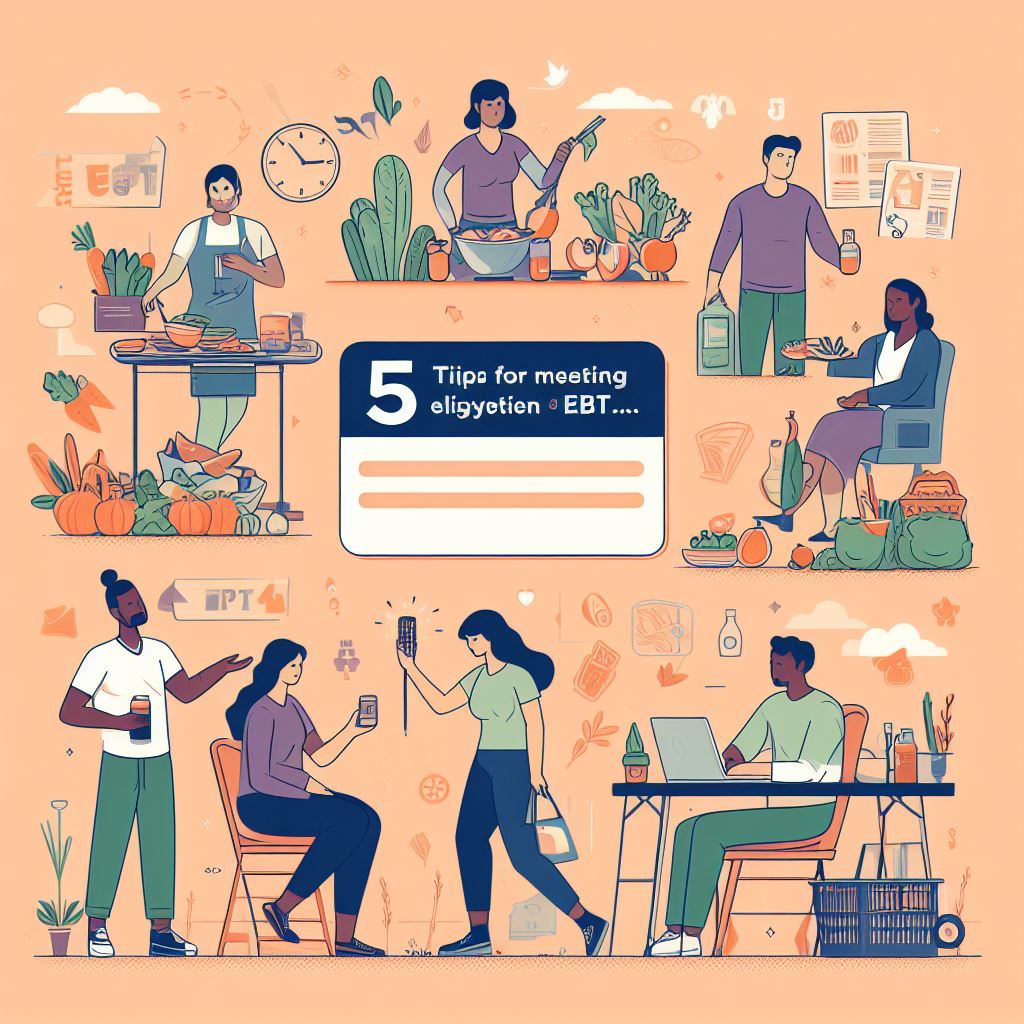5 Tips: Meeting Eligibility Requirements for EBT Cards

If you’re wondering how to meet the eligibility requirements for EBT cards, we’ve got you covered.
In this article, we’ll give you five tips that will help you navigate the process.
From understanding income and asset limits to gathering the necessary documentation, we’ve got all the information you need.
So, let’s dive in and make sure you’re on the right track to accessing the benefits you deserve.
Key Takeaways
- Calculate household’s gross monthly income and compare it to Federal Poverty Level (FPL) guidelines.
- Assess current financial holdings and be aware of government-set asset limits that vary by state.
- Gather all necessary documentation including proof of identity, residency, income, and expenses.
- Understand categorical eligibility provisions and check if you are already receiving benefits from qualifying programs.
Determine Your Income Eligibility
Determine if you qualify for an EBT card by evaluating your income eligibility.
To determine your income eligibility for an EBT card, you need to assess your current financial situation.
The first step is to calculate your household’s gross monthly income. This includes all sources of income such as wages, self-employment earnings, social security benefits, and child support.
Next, you need to compare your gross monthly income to the Federal Poverty Level (FPL) guidelines. These guidelines vary depending on the number of people in your household. If your household income is at or below the FPL, you may be eligible for an EBT card.
It is important to note that certain deductions, such as housing and childcare expenses, can be taken into account when determining your income eligibility. These deductions can lower your gross monthly income, potentially increasing your chances of qualifying for an EBT card.
To apply for an EBT card, you’ll need to provide documentation of your income, such as pay stubs or tax returns. It’s essential to be honest and accurate when reporting your income to ensure that you meet the eligibility requirements.
Understand the Asset Limits
To determine if you meet the asset limits for an EBT card, you should assess your current financial holdings. Asset limits refer to the total value of assets you own, such as money in bank accounts, investments, and property. These limits are set by the government and vary from state to state. It’s important to understand these limits because exceeding them may make you ineligible for EBT benefits.
When assessing your assets, consider both liquid and non-liquid assets. Liquid assets include cash, savings, and checking accounts, while non-liquid assets include property, vehicles, and investments. The value of these assets is taken into account when determining your eligibility for EBT benefits.
It is crucial to note that not all assets count towards the asset limits. Some assets, such as your primary residence and personal belongings, are exempt. Additionally, certain types of assets, such as retirement accounts and education savings accounts, may be excluded from consideration.
To ensure accuracy, gather all necessary documentation regarding your assets, such as bank statements and property deeds. If you’re unsure about any specific assets or their value, consult with a financial advisor or contact the relevant government agency for clarification.
Gather Necessary Documentation
When gathering necessary documentation for your EBT card application, ensure that you have all relevant financial records and identification ready. This will help streamline the application process and avoid any delays. Here are the key documents you’ll need to gather:
- Proof of identity: Provide a valid photo identification such as a driver’s license, passport, or state-issued ID card. This will establish your identity and prevent any fraudulent activity.
- Proof of residency: Include documents that demonstrate your current address, such as utility bills, lease agreement, or official mail. This is necessary to confirm that you reside within the eligible area.
- Proof of income: Gather recent pay stubs, tax returns, or a letter from your employer to verify your income. This will determine if you meet the income requirements for the EBT program.
- Proof of expenses: Collect receipts, bills, or statements that show your monthly expenses, such as rent, utilities, childcare, and medical costs. This helps determine your eligibility and the amount of benefits you may receive.
Familiarize Yourself With Categorical Eligibility
To ensure you meet the eligibility requirements for EBT cards, it is important to familiarize yourself with categorical eligibility. Categorical eligibility is a provision that allows certain individuals or households to automatically qualify for the Supplemental Nutrition Assistance Program (SNAP) based on their participation in other assistance programs. By understanding the different categories of eligibility, you can determine if you qualify for an EBT card.
Here is a table that outlines the categories of categorical eligibility:
| Category | Qualifying Programs |
|---|---|
| Temporary Assistance | Temporary Assistance for Needy Families (TANF) |
| Medicaid | Medicaid |
| Supplemental Security | Supplemental Security Income (SSI) |
| Women, Infants, and | Women, Infants, and Children (WIC) |
| Children | Low-income Home Energy Assistance Program (LIHEAP) |
If you are already receiving benefits from any of these programs, you may be automatically eligible for an EBT card. It is important to note that each state may have its own requirements and criteria for categorical eligibility. Therefore, it is essential to check with your local SNAP office to confirm your eligibility.
Seek Assistance From Local Resources
If you’re unsure about your eligibility for an EBT card, local resources can provide valuable assistance. Here are some ways local resources can help you determine your eligibility and navigate the application process:
- Community Centers: Local community centers often have staff or volunteers who can provide information and guidance on EBT eligibility requirements. They can also help you with the application process and any necessary documentation.
- Social Service Agencies: Social service agencies, such as the Department of Social Services or the Department of Health and Human Services, can offer support in determining your eligibility for an EBT card. They’ve trained professionals who can assess your situation and guide you through the application process.
- Food Banks: Food banks not only provide food assistance but can also offer information on EBT eligibility. They may have staff or volunteers who can answer your questions and help you understand the requirements.
- Nonprofit Organizations: Nonprofit organizations focused on poverty alleviation or social welfare often have resources available to help individuals determine their eligibility for government assistance programs like EBT. They may offer workshops, informational materials, or one-on-one assistance.
Frequently Asked Questions
How Long Does It Typically Take for an EBT Card Application to Be Approved or Denied?
Typically, it takes a few weeks for an EBT card application to be approved or denied. The process involves reviewing your eligibility and verifying the information you provide.
Can I Apply for an EBT Card if I Am Unemployed or Receiving Unemployment Benefits?
Yes, you can apply for an EBT card if you are unemployed or receiving unemployment benefits. Meeting the eligibility requirements is important, so make sure to provide the necessary documentation when applying.
Are There Any Specific Restrictions on What I Can Purchase With an EBT Card?
You can only use your EBT card to purchase eligible food items like fruits, vegetables, dairy products, meat, and bread. Non-food items like alcohol, tobacco, pet food, and hot prepared foods are not allowed.
Can I Still Qualify for an EBT Card if I Am a Student?
Yes, you can still qualify for an EBT card if you are a student. However, you must meet the specific eligibility requirements set by your state to determine if you are eligible.
Is There a Maximum Time Limit for How Long I Can Receive Benefits Through the EBT Card Program?
You can receive benefits through the EBT card program for a maximum time limit. It’s important to check with your local agency to determine the specific time limit for your state.



